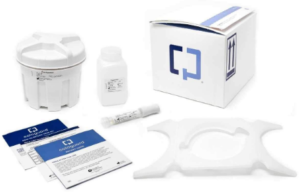
If colon cancer is causing your stools to be pencil thin, this doesn’t mean that the stools cannot return to normal.
So if you’ve been noticing pencil thin stools and fearing colon cancer, do NOT feel reassured if this appearance at some point returns to what is normal for your bowel movements.
This returning back to normal does not rule out cancer of the colon.
The return back to normal-appearing bowel movements would simply be due to the tumor shifting position.
“Narrow stools can result from a very low rectal cancer or an anal cancer that is partially blocking the exit of bowel movement,” says gastroenterologist Sander R. Binderow, MD, FACS, FASCRS, with Atlanta Colon & Rectal Surgery.
He continues, “Stool size, however, is a very non-specific finding and does NOT confirm or refute the presence of a colon cancer.
“Most stool size and consistency is due to the environment (diet, amount of liquids, stress, etc.) and not due to colon disease.”
This is why narrow, pencil thin stools have numerous causes other than colon cancer.
Dr. Binderow explains, “Patients with diarrhea disorders, such as Crohn’s or ulcerative colitis, tend to have a thinner, looser stool.
“The inflamed colon cannot absorb water as well, nor gently distend to store stool. It comes out quicker and with less form.”
So what should you do if your BMs have become as narrow as a pencil?
There is a home screening test that you can take for colon cancer.

It does not diagnose this disease, but it uses the latest in DNA technology to detect cells that are abnormal.
The test is called Cologuard.
If the sample that you take from home is determined to contain abnormal cells, then a colonoscopy would be recommended.
Signs of Colon Cancer to Be on the Lookout For
Of course, you know that colon cancer can cause long, pencil-like bowel movements.
Or, with this disease, a bowel movement can come out resembling ribbons.
What would really increase the suspicion for colon cancer are additional signs such as blood in your stools, abdominal pain unrelated to BMs, and unexplained fatigue and weight loss.
Colorectal cancer can also cause a sensation that you still have BMs that need to come out, even though you just had a bowel movement.
Sometimes this is normal, and very soon after, you have another movement, and all is fine.
But colon cancer may create this sensation because the tumor itself is positioned in a way that makes a person feel as though they did not fully evacuate — even though they actually did.
 Dr. Binderow performs minimally invasive, robotic and laparoscopic surgery for Crohn’s disease, ulcerative colitis, colon cancer and other colorectal conditions. Adept at routine procedures, Dr. Binderow also sees patients with complex, atypical maladies.
Dr. Binderow performs minimally invasive, robotic and laparoscopic surgery for Crohn’s disease, ulcerative colitis, colon cancer and other colorectal conditions. Adept at routine procedures, Dr. Binderow also sees patients with complex, atypical maladies.
 Lorra Garrick has been covering medical, fitness and cybersecurity topics for many years, having written thousands of articles for print magazines and websites, including as a ghostwriter. She is also a former ACE certified personal trainer.
Lorra Garrick has been covering medical, fitness and cybersecurity topics for many years, having written thousands of articles for print magazines and websites, including as a ghostwriter. She is also a former ACE certified personal trainer.
.
Top image: Shutterstock/dizain













